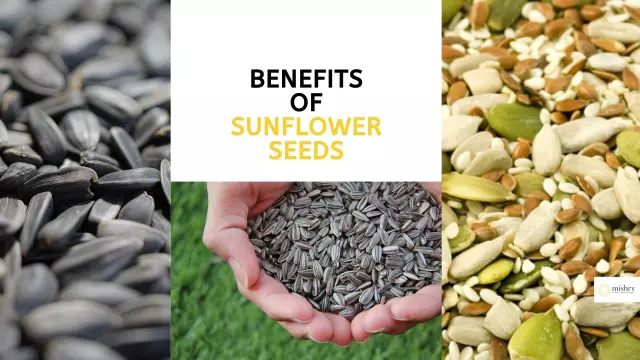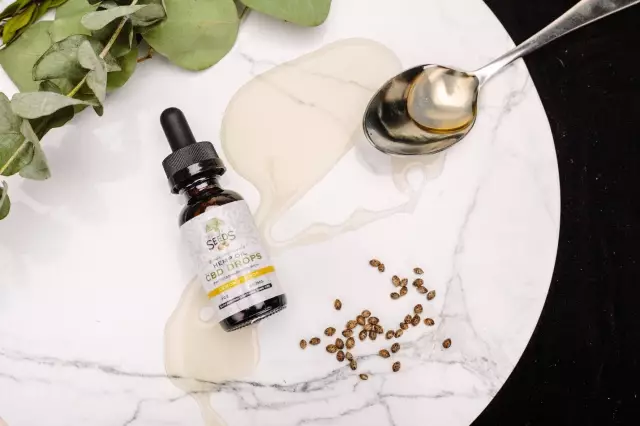- Author Rachel Wainwright wainwright@abchealthonline.com.
- Public 2023-12-15 07:39.
- Last modified 2025-11-02 20:14.
Sunflower
Instructions for use:
- 1. Useful properties
- 2. Application in traditional medicine

Sunflower (oily or annual sunflower) is an annual plant of the Astrov family, has a thick stem with one or more heads, and can reach a height of 4 meters. A single head in diameter can reach 50 cm, its marginal petals are yellow, in the middle are orange. The sunflower fruit is a tetrahedral achene. It is known that 100 grams of roasted sunflower seeds contain more than 20 grams of protein, 3.4 grams of carbohydrates and 52 grams of fat.
The sunflower was imported from North and South America, now it is grown almost all over the world for the production of sunflower oil. This plant also has medicinal properties, but not everyone knows about the benefits of sunflower.
Useful properties of sunflower
This plant has healing properties, it is used to improve digestion, as an expectorant, and also to reduce body temperature during infectious processes.
In folk medicine, leaves, marginal flowers, stems and even sunflower roots are used. The leaves and flowers contain flavonoids (quercimerithrin), betaine, choline, carotene (provitamin A), sterols and other beneficial substances. In addition, the leaves of the plant are rich in resins and rubber. Sunflower seeds contain oil and fatty acids (linolenic, lignoceric and oleic).
Leaves are collected separately, and only those are selected that are intact and not damaged by insects. They are torn from the trunk and dried in the fresh air in a dark place. Sunflower flowers are harvested at the beginning of flowering and dried in a shaded area. The prepared raw materials are stored in canvas or paper bags.
The use of sunflower in traditional medicine
The healing properties of sunflower are used for jaundice, diseases of the gallbladder (chronic cholecystitis, dyskinesia), diseases of the respiratory system, infectious diseases (influenza, malaria, etc.) and many other ailments.
A decoction of the middle flowers is used for jaundice, diseases of the liver and biliary tract, for intestinal dyskinesia, and for bronchial asthma. An alcoholic tincture of reed flowers and sunflower leaves helps with an increase in temperature (caused by influenza, acute respiratory infections, malaria) and with neuralgia of various origins. Also, an alcoholic tincture from the leaves is used to improve appetite.
A decoction of sunflower leaves is an excellent diuretic (diuretic) and also helps with diarrhea.
Sunflower seed oil can be used for the prevention of atherosclerosis, as it is rich in polyunsaturated fatty acids that prevent the formation of atherosclerotic plaques on the vascular endothelium. In addition, it is used as a laxative. Boiled sunflower oil helps as a wound healing agent for wounds and burns (oil dressings). It can also be used in oil inhalations in the treatment of bronchitis, pneumonia.
The benefits of sunflower are used for arthritis and arthrosis of various etiologies. The "cap" of this plant has healing properties, and an oil extract is made from it, which is used for external rubbing of the area of sore joints.
Sunflower roots are used for "excretion of salts" in case of urolithiasis, gout. Tea is made from the roots: pour 1 cup of crushed roots with 3 liters of water and boil for 1-2 minutes. All tea should be consumed within 2-3 days. The entire process of removing salts takes 1-2 months, and you should abandon hot seasonings, pickles, vinegar and smoked products.

The healing properties of sunflower can also be used for herpes. To do this, wash and scald a sunflower petal with boiling water and fix it with a plaster in place of the rash. You need to change the petal every 2-3 hours.
With increased nervous excitability, the following recipe is used: 3 tablespoons of dried sunflower flowers should be poured with 250 ml of vodka. Insist for a week in a dark place, then strain and take 40 drops (per 50 ml of water) twice a day before meals.
The benefits of sunflower can also be useful for psoriasis. For this, an oil tincture is used, which is prepared as follows: place the dried petals in a liter jar (up to 2/3 volume) and pour vodka. Insist for 21 days in a dark place, stirring occasionally. The finished tincture should be dark brown and oily. She wipes psoriatic skin rashes during the period of exacerbation of the disease.
In addition, an oily tincture of sunflower petals can be used for colds. For this purpose, it should be used 1 tablespoon 3 times a day. In children under 7 years old, this tincture is not used, children over this age are given ½ teaspoon three times a day. When treating colds, sunflower tincture should be used for no more than 3 days.
Information about the drug is generalized, provided for informational purposes only and does not replace the official instructions. Self-medication is hazardous to health!






